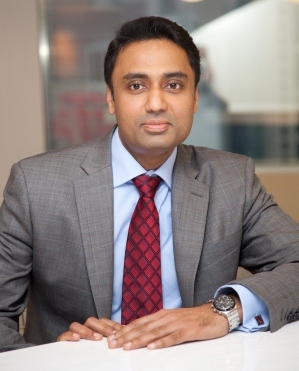
Sainsbury: What are your priorities for the next 12-18 months?
Vengayil: Our key priorities include implementing systems that enable more efficient data management, risk monitoring and reporting. Another priority is to offer better compliance and surveillance management, and a more robust BCP infrastructure.
We believe that all of these aspects will enable the teams across the region to have a better overview of their businesses and let them respond more efficiently to the ever-changing demands of a dynamic business environment.
We will also explore opportunities to leverage on our global tools and implement them in countries where they can work efficiently, without compromising on the local business requirements.
Sainsbury: How do you see the drive towards technology innovation impacting on the financial services industry in short to medium term?
Vengayil: Today, technology is everywhere and has changed the way we live. Businesses are no different. Innovations are empowering clients and businesses to be better connected and manage their data more efficiently. As a result, business models are being re-designed to stay relevant and serve the needs of clients.
Technology has also enabled businesses to reach and service clients like never before. More channels and hence increased client ‘touch-points’ translates into better opportunities for businesses to grow. The fast growing social media could play a critical role in the growth of the financial services industry.
Sainsbury: BNP Paribas operates in 12 countries in the Asia Pacific region. What has been the most effective approach to the IT systems to ensure it adequately meets the need of each country?
Vengayil: As an organisation, we believe in ‘thinking global and acting local’. As a financial services powerhouse, we have globally proven systems and world-class technology solutions to support our businesses worldwide. However, local needs and requirements drive the implementation of these systems across the world.
Of course, implementing globally successful systems helps us integrate and improve efficiencies. But, we retain the flexibility to let our individual countries choose the model they want to implement to enable them to respond better to the needs of their local businesses and clients.
However as a global asset manager, we drive some level of sophistication and hence implement global best-practices in areas like investment and risk management and reporting This enables our local businesses to align our product proposition to clients across territories geographies.
Sainsbury: What are your thoughts on the benefits of mobile device rollouts within banks?
Vengayil: As I mentioned before, technology and innovation are driving businesses across the globe to re-design and adapt to the changing environment. Client ‘touch-points’ are increasing and businesses are now able to know about their clients and their behaviour in more ways than one. Robust data management and mining technologies can help businesses predict needs and respond faster.
Mobile devices offer clients the convenience of conducting their businesses at a place of their choice and at a time convenient to them. We may not have to look too far ahead in time when the mobile device will replace the wallet. Newer technologies will also improve cost and operating efficiencies for businesses.
Sainsbury: What role do you see Cloud computing playing in the banks of the future?
Vengayil: Cloud computing promises to be an exciting new technology and is being looked at seriously by financial institutions worldwide. Like any new technology, this one too will be evaluated for performance and robustness before being accepted widely by businesses.
Sainsbury: How do you see the regulatory environment changing in banking?
Vengayil: Like organisations, regulators across the world are now realising that they need to keep pace with the rate at which technology is evolving and re-defining the way businesses are being conducted. Newer technologies means better and more robust regulatory framework. Regulations are now looking at the implications of technology and are being re-written to keep pace with the changes.
Sainsbury: What is your approach to fostering innovation within your team?
Vengayil: Innovation in technology is key for our business to grow and thrive in this environment. The challenge is to constantly keep in touch with advancements and continuously think of ways and means of adopting these to improve our product and services offered. Newer ways need to be evaluated; efficient solutions need to be provided to our teams across functions to enable them to respond to a dynamic market environment.
Innovation is a key parameter to judge the success of our team and we are constantly driven by the need to explore opportunities for enabling and empowering our businesses to differentiate themselves from the clutter.
Sainsbury: Which business or technology leaders inspire you, and why?
Vengayil: Steve Jobs is one of the most inspiring technology leaders that the world has ever seen. He used innovations and the ambition to deliver a better user experience to take his organisation from the brink to becoming one of the most successful organisations globally. Together with an inspired and passionate team, he redefined the way we look at and use technology forever.
Sainsbury: What advice would you give to someone looking to step into a C-level executive role?
I would advise anyone entering this field to be driven and passionate. To have the constant drive for learning and love technology. And most of all, believe that he/ she is helping the business grow and be more efficient.
Sainsbury: Every IT leader, particularly at your level, has a legacy they wish to be remembered for. What is yours?
Vengayil: I wish to be remembered as someone who constantly drove innovation and aimed to empower the business with better and more efficient solutions.





